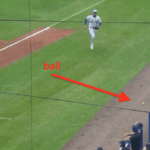AWARDING BASES ON WILD THROWS
Rule 5.06(b)(4)(G):
See Official Baseball Rule 5.06(b)(4)(G) regarding awarding of bases on balls that are thrown out of play. In making such awards, keep the following points in mind:
(1) If the throw is the first play by an infielder and the batter-runner has not reached first base when the throw was made, award all runners from time of pitch.
(2) If the throw is the first play by an infielder and all runners including the batter-runner have advanced a base when the throw was made, award all runners from their positions at the time of the throw.
(3) If the throw is not the first play by an infielder or the throw is made by an outfielder, award all runners from their positions at the time of the throw.
The Approved Ruling of Official Baseball Rule 5.06(b)(4)(G) provides that when the first throw is by an infielder after runners and batter have advanced one base, then runners are awarded two bases from their position when the throw was made. (See item (2) above.) This can happen on a high fly that an infielder goes back to catch but drops, during which time the batter and runners have clearly advanced one base; then, in an attempt to put out the batter-runner, who has already passed first base, the fielder throws the ball into the stands. While it is the first throw by an infielder, the runners, including the batter-runner, had advanced one base before the throw and accordingly are awarded two bases from the base they last touched when the throw was made. Before awarding two bases from the base last touched by the runners, the umpire must judge that all the runners—including the batter-runner—have definitely advanced to the next base before the throw was made.
The term “when the wild throw was made” means when the throw actually left the player’s hand and not when the thrown ball hit the ground, passed a receiving fielder, or went out of play into the stands.
When a runner is awarded bases without liability to be put out because the ball has gone out of play, the runner is not relieved of the responsibility to touch the awarded base and all intervening bases.
In awarding of bases, crews should have the benefit of input of their partners. If there is any question as to the proper award, it is suggested the umpires confer as a crew.




